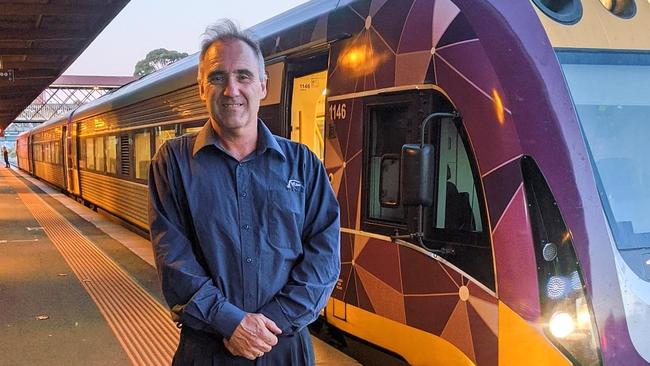‘It’s nearly every day’: $7.9M to clean-up roos killed by trains at Kangaroo Flat
The Kangaroo Flat train line is living up to its namesake – killing kangaroos – and being rewarded with a $7.9 facility to clean up the mess.

Bendigo
Don't miss out on the headlines from Bendigo. Followed categories will be added to My News.
The Kangaroo Flat train line is getting a $7.9 million facility for living up to its namesake – killing kangaroos.
The facility, based in Bendigo, will clean animal blood from trains that run along the 160km line from Melbourne to Bendigo.
In 2020 there were 165 animal collisions between Bendigo and Melbourne which is more than a third of all cases in the Victorian network.
Train driver Peter Reeves said the Kangaroo Flat station was “more literal” than most commuters realised.
He said after 35 years as a driver he was not surprised it was responsible for the most animal deaths.
“It (kangaroo deaths) is nearly everyday on the Bendigo line,” he said.
“If we could avoid it, we would – but we can’t.”
While kangaroos were the most common victim of the rails, Mr Reeves said cow, sheep or goats are also killed by trains.
He said the larger the animal the greater the chance of damaging the train - or stopping it in its tracks.
“Kangaroos are quite large and you hit them hard... and cows can cause quite a bit of grief,” Mr Reeves said.
“It’s a loud bang... people in the first carriage can hear it.”
Mr Reeves said if the animal was caught under the carriages passengers would hear it “rattle” underneath them.
The train driver said all collisions were reported, with the trains needing to be taken to the bio-wash facility at South Dynon Locomotive Depot, near Southern Cross Station, for cleaning.
Mr Reeves said the new Bendigo bio-wash facility would mean regional trains could be cleaned, fixed and back on the tracks faster.
Public Transport Minister Ben Carroll said the $7.9 million indoor facility would create 50 jobs during the construction phase and up to eight ongoing cleaning jobs.
Mr Carroll said the bio-wash would transform an unused train stabling area near Bendigo Station into a state-of-the-art facility with cleaning equipment and elevated railing for a more thorough inspection.
He said the facility would be built by Coleman Rail and managed by V/Line’s train maintenance provider Alstom.
Mr Carroll said it was essential to meeting the growing demand of the regional network.
V-Line said the second most dangerous train corridors for animal collisions was the west line to Ballarat, with 125 incidents, followed by the north east to Albury, with 72.





